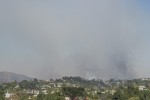UCLA canceled classes Wednesday and Thursday due to poor air quality following the Skirball fire in the Bel-Air area. The Daily Bruin’s Emi Nakahara spoke with Suzanne Paulson, an atmospheric and oceanic sciences professor whose research focuses on air pollution in urban environments, to discuss the possible health impacts of the air quality on campus and Westwood during the fire.
Daily Bruin: How would you rate the air quality in Westwood currently?
Suzanne Paulson: Currently it’s great, it’s super clear. Current air monitors are showing normal levels of air quality for the Westwood area. Generally when it’s windy like this, concentrations of pollutants are pretty low unless there’s a local source, which means the fires are pretty much under control.
However, concentrations were very high (Wednesday), around the range that was unhealthy for sensitive groups such as the elderly and those with respiratory issues.
We have a national ambient air quality standard of 35 micrograms of pollutant particles per cubic meter for the small combustible particles. Yesterday the air had concentrations of up to 70 micrograms per cubic meter, maybe over 100 briefly at one point.
In major cities in China and India, these concentrations have often been as much as 500 micrograms per cubic meter, and we’re nowhere near those ranges.
DB: Would you say the campus is safe?
SP: At the moment, yes. The fire is largely under control, combined with high winds which generally reduce urban air pollution, and looking outside my window right now the sky looks clear.
DB: What kinds of pollutant elements are released during a fire? Which are the most dangerous?
SP: What’s the most concerning from a health standpoint are the small combusted pollutant particles which tend to be small in size, about 2.5 microns. There’s a wide range of health effects from particle inhalation, and long-term exposure in particular can have negative health effects.
Young people such as students, unless they have respiratory issues like asthma, aren’t severely affected. However for older people, inhaling these particles can cause cardiovascular problems such as heart attacks and strokes.
DB: Do over-the-counter masks help in filtering out pollutants and dust?
SP: In general they don’t work much, since the particles are microscopic. There are masks that work in these conditions, but they have to have a very tight seal so air only goes through the mask filter.
DB: Any general advice for those who are outside you’d like to give?
SP: At the moment there’s nothing to worry about. When it is really smoky, try to avoid breathing in lots of air outside and stay indoors, since only some, but not most, of the particles are present indoors.
